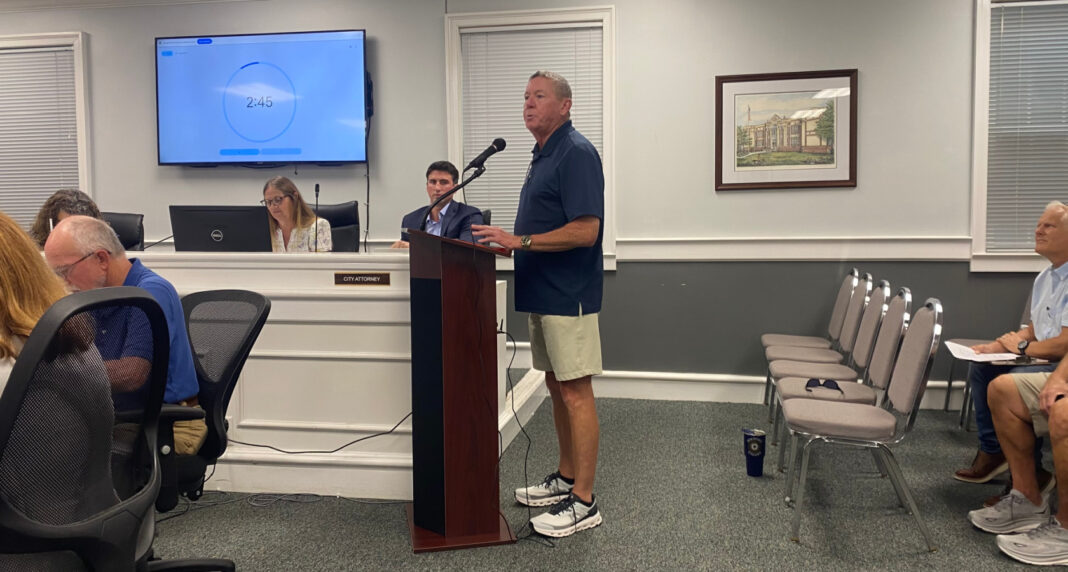OCEAN SPRINGS, MS – At Tuesday night’s Board of Aldermen meeting, former Ocean Springs Police Chief Mark Dunston stood at the podium and expressed confusion over why residents are upset about his newly revealed role with Securix – the controversial company that once partnered with the city to issue automated tickets to uninsured motorists.
Dunston told the board he didn’t understand why the public was upset that he was receiving secret paychecks from Securix while his department simultaneously oversaw the city’s contract.
He was also rattled about accusations that the system bypassed the court.
GC Wire’s previous investigation into the program revealed that, under Ocean Springs City Attorney Robert Wilkinson’s legal oversight and Dunston’s police leadership, the Securix program mailed citations that mimicked court summonses and threatened license suspension, yet completely bypassed judicial review. Although the Securix contract required citations to be filed in municipal court and records maintained by the city, those rules were ignored by the two in charge of the system.
While Dunston was playing dumb at the board meeting, he was simultaneously profiting from nearly an identical scheme in two other Mississippi cities — only this time, as co-owner of the company.
Dunston and Wilkinson now operate Intellisafe LLC, a private enforcement company issuing automated speeding citations in Hattiesburg and Moss Point, using handheld camera systems to identify offenders — except this time, the legal safeguards that were ignored in Ocean Springs have been stripped from the contract entirely.
Now that Wilkinson and Dunston own the company, they can avoid those pesky clauses altogether.
A Private Court within a Courthouse
State law requires all traffic citations to have judicial oversight. That means when a ticket is issued, it should automatically trigger a court record.
To test whether the Intellisafe program involves the judiciary at all, GC Wire called the Hattiesburg Municipal Court to ask about a citation. What the court clerk revealed was nothing short of amazing.
“The municipal court and the police department are on that piece of paper, but we have nothing to do with IntelliSafe,” the clerk said before dropping what can only be considered a bombshell: “The only thing is they use our lobby for their court.”
Intellisafe is holding their own private court at the Hattiesburg municipal courthouse. No real judges. No real judicial oversight. Just a private company deciding your fait – in the lobby of a real courthouse.
Listen to the shocking call here:
.
Intellisafe Employee Explains the Shady Process
A Hattiesburg resident, who wishes to remain anonymous, did a little testing of his own. The man received a ticket and attended one of these sham courts. He secretly recorded the interaction. GC Wire reviewed the audio.
Inside the Hattiesburg municipal courthouse, he told officials he was there for the court date listed on his speeding ticket. Officials directed him to an Intellisafe employee named Blake. The man told Blake he was there to see a judge.
Blake corrected him: “I’m the court liaison. You’re here for the options arraignment.”
Blake went on to explain those options.
- Watch a video and pay $230 to the company website.
- Don’t pay and be sent to collections, “which will affect your credit score.”
When the man pushed, stating he wants to see a judge, Blake offered one final solution: log onto the company’s website and sign a waiver that allows Intellisafe to send evidence of the speeding to the city of Hattiesburg. “Will I then get to see a judge,” the man asked. “If the city chooses to take action,” Blake responded.
The man was less than amused.
Lawsuits Challenge the Legality
What’s happening in Hattiesburg and Moss Point hasn’t gone unnoticed. Intellisafe is now facing two lawsuits — one in state court, the other in federal — both alleging that the company’s operation is not only deceptive but fundamentally unconstitutional.
Moss Point: The Pilot Program, Now in Court
The first legal challenge emerged from Moss Point, the city that served as Intellisafe’s launchpad. There, a local resident filed suit after receiving a ticket that looked like a government-issued citation, complete with city branding and a court date — but was, in fact, part of the same privatized system now operating in Hattiesburg.
The lawsuit, filed in Jackson County Circuit Court, accuses Intellisafe of misleading citizens into thinking they are dealing with the judicial system, when in reality, they are interacting with a private vendor enforcing penalties without a judge, without a case number, and without any formal charges ever filed.
Adding to the controversy: the contract was approved by then-Moss Point City Attorney Amy St. Pé — a former law partner of Robert Wilkinson. This connection raises serious ethical questions about how Intellisafe gained its foothold and whether legal insiders were used to quietly greenlight a system designed to bypass oversight.
Hattiesburg: Now in Federal Court
The second — and more sweeping — lawsuit was filed in federal court earlier this year by Gerry Mallory, a Hattiesburg resident who received an Intellisafe ticket and soon realized he had no access to court, no assigned case, and no real way to contest the charge.
Mallory’s federal complaint pulls no punches. It accuses Intellisafe and the City of Hattiesburg of violating his Fifth, Sixth, and Fourteenth Amendment rights, as well as Mississippi statutes requiring sworn affidavits and court filing before prosecution.
“The City and Intellisafe are operating a revenue-generation program without judicial oversight, where citations are mailed with false court appearances and empty threats of license suspension.”
— Federal Complaint, Mallory v. City of Hattiesburg
His lawsuit says what many residents now suspect: the entire program is a legal illusion, crafted to appear like government enforcement while functioning like a private collections operation.
And the kicker? Wilkinson, still serving as Ocean Springs’ city attorney, is also Intellisafe’s attorney of record in the federal case. He filed a motion to dismiss the lawsuit, arguing that Mallory had every opportunity to challenge the citation — even though the ticket was never filed in court.
In that filing, Wilkinson insisted the system is legal because:
- A court hearing is technically available upon request.
- The plaintiff waived his rights by paying instead of contesting.
But Wilkinson’s legal defense ignores a critical truth: citizens don’t know how to contest — because there is no court record, no sworn citation, and no judicial process unless they first sign a waiver giving the private company permission to send their information to the court.
And, as the Hattiesburg court clerk plainly stated:
“Yeah, it’ll never be in our system.”
Ocean Springs: Where the Infection Began
None of this should surprise anyone in Ocean Springs.
Residents here already lived through the first wave — when Dunston and Wilkinson teamed up with Securix to run a program that mailed citations with official-looking court dates, threatened license suspension, and then quietly skipped over the court entirely.
Only in Ocean Springs, they did it while holding public office.
The Securix contract clearly required citations to be filed in municipal court and for the city to retain all records. Dunston and Wilkinson did neither. Not only did they skirt the contract — they ignored the law that governs how citations must be sworn, filed, and adjudicated.
Then, when public scrutiny emerged, Wilkinson claimed he was “100% recused” from the Securix program.
But evidence later revealed he was anything but. Emails, interviews, and public records obtained by GC Wire showed Wilkinson was:
- Directing Securix staff,
- Coordinating with the municipal judge,
- Managing public relations fallout,
- And even calling the police chief to run damage control against critics.
So much for recusal.
Now, the scheme that started in Ocean Springs is spreading like a civic virus — from Jackson County to Forrest and beyond — with Dunston and Wilkinson exporting their model of shadow enforcement into new cities.
Their new model strips out the safeguards they once ignored. No more municipal records. No more court docket requirements. Just handheld cameras, misleading tickets, and “arraignments” run by private contractors in government lobbies.
Mississippians in Hattiesburg and Moss Point are now learning what Ocean Springs residents already found out the hard way: When Wilkinson and Dunston say it’s legal — read the fine print, check the court docket, and hold onto your wallet.
When court becomes a customer service desk, and justice is managed by someone who introduces himself as a “liaison,” your rights have already left the building.



So, does the camera that HPD was/is using belong to the private vendor? If so, is HPD doing the work for a private company on taxpayer money?